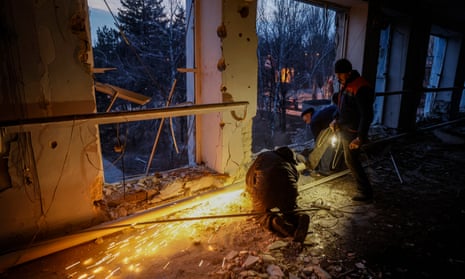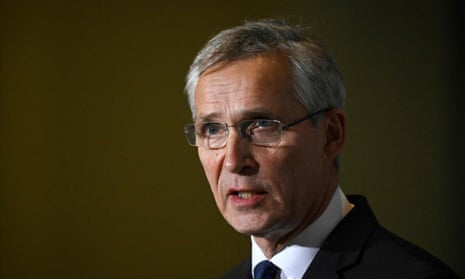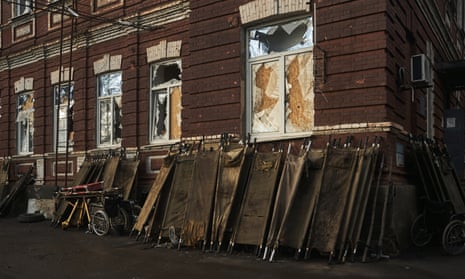
Live feed
From 23m ago
Nato chief warns against conflict spiralling into Russia-Nato war
The head of Nato has expressed worry that the fighting in Ukraine could spin out of control and become a war between Russia and Nato, according to an interview released Friday.
“If things go wrong, they can go horribly wrong,” Nato’s secretary general, Jens Stoltenberg, said in remarks to Norwegian broadcaster NRK.
It is a terrible war in Ukraine. It is also a war that can become a full-fledged war that spreads into a major war between Nato and Russia. We are working on that every day to avoid that.
Associated Press also reported that the Stoltenberg said in the interview that “there is no doubt that a full-fledged war is a possibility”.
Stoltenberg, a former prime minister of Norway, added that it was important to avoid a conflict “that involves more countries in Europe and becomes a full-fledged war in Europe”.

Moscow has repeatedly accused Nato allies of effectively becoming a party to the conflict by providing Ukraine with weapons, training its troops and feeding military intelligence to attack Russian forces.
Speaking about a disarming strike, maybe it’s worth thinking about adopting the ideas developed by our U.S. counterparts, their ideas of ensuring their security.
Key events
Heavy fighting has continued in eastern and southern Ukraine, mainly in regions that Russia illegally annexed in September.
Associated Press reported Ukraine’s presidential office as saying on Friday that five civilians had been killed and another 13 wounded by Russian shelling in the past 24 hours.
Donetsk’s regional governor, Pavlo Kyrylenko, said Russian forces were pressing an offensive on Bakhmut with daily attacks, despite taking heavy casualties.
He said in televised remarks:
You can best describe those attacks as cannon fodder. They are mostly relying on infantry and less on armor, and they can’t advance.
In neighbouring Luhansk in eastern Ukraine, the regional governor, Serhiy Haidai, said the Ukrainian military was pushing its counteroffensive toward Kreminna and Svatove.

In the south, Kherson’s regional governor, Yaroslav Yanyshevych, said eight civilians were wounded by Russian shelling in the past 24 hours. In Kherson city, which Ukraine recaptured last month, a children’s hospital and a morgue were damaged.
In the neighbouring Zaporizhzhia region, Russian forces shelled Nikopol and Chervonohryhorivka, which are across the Dnieper River from the Russia-occupied Zaporizhzhia nuclear power plant.
Zaporizhzhia’s governor, Valentyn Reznichenko, said Russian shelling damaged residential buildings and power lines.
In the Kharkiv region, in the north-east, governor Oleh Syniehubov said three civilians were wounded by Russian shelling, with one later dying.
Nato chief warns against conflict spiralling into Russia-Nato war
The head of Nato has expressed worry that the fighting in Ukraine could spin out of control and become a war between Russia and Nato, according to an interview released Friday.
“If things go wrong, they can go horribly wrong,” Nato’s secretary general, Jens Stoltenberg, said in remarks to Norwegian broadcaster NRK.
It is a terrible war in Ukraine. It is also a war that can become a full-fledged war that spreads into a major war between Nato and Russia. We are working on that every day to avoid that.
Associated Press also reported that the Stoltenberg said in the interview that “there is no doubt that a full-fledged war is a possibility”.
Stoltenberg, a former prime minister of Norway, added that it was important to avoid a conflict “that involves more countries in Europe and becomes a full-fledged war in Europe”.

Moscow has repeatedly accused Nato allies of effectively becoming a party to the conflict by providing Ukraine with weapons, training its troops and feeding military intelligence to attack Russian forces.
Speaking about a disarming strike, maybe it’s worth thinking about adopting the ideas developed by our U.S. counterparts, their ideas of ensuring their security.
Summary
Hello and welcome back to the Guardian’s continuing live coverage of the Russia-Ukraine war.
Vladimir Putin has raised the possibility of a settlement to end the war in Ukraine, while maintaining that his military offensive is still going to plan.
The Russian president said:
The settlement process as a whole, yes, it will probably be difficult and will take some time – but one way or another, all participants in this process will have to agree with the realities that are taking shape on the ground.
Putin’s remarks on Friday – at a press conference in Bishkek, Kyrgyzstan – came just days after he said the military operation could be a “long-term process”.
Here’s a brief rundown on the other latest developments in the war.
Explosions have been reported at Berdiansk airbase in Ukraine’s Zaporizhzhia region. Three large explosions were heard, as well as smaller ones, near the Russian-occupied city on the coast of the Sea of Azov.
Ukraine says its southern regions are suffering the worst electricity outages days after the latest bout of Russian attacks on the country’s energy grid. The head of Ukraine’s grid operator Ukrenergo, Volodymyr Kudrytskyi, said workers were struggling most to restore power in the Black Sea regions of Odessa, which was badly hit on Monday, and around the recently recaptured city of Kherson.
Vladimir Putin said Russia could amend its military doctrine by introducing the possibility of a pre-emptive strike to disarm an enemy, in an apparent reference to a nuclear attack. Speaking just days after warning that the risk of nuclear war was rising but Russia would not strike first, Putin said on Friday that Moscow was considering whether to adopt what he called Washington’s concept of a pre-emptive strike.
Ukraine’s foreign minister said his government was working with the UN’s nuclear watchdog to create a safety zone around the Russian-held Zaporizhzhia nuclear plant. Dmytro Kuleba said at a joint press conference in Kyiv with his Slovak counterpart, Rastislav Káčer, that Kyiv remained “in close contact” with Rafael Grossi, the International Atomic Energy Agency head.
Russia claimed its proposed safety zone around the Zaporizhzhia plant was to “stop Ukrainian shelling”. Russia’s foreign ministry spokesperson, Maria Zakharova, also said the US’s withdrawal from a treaty banning intermediate-range nuclear missiles was a “destructive” act that created a vacuum and stoked additional security risks.
President Joe Biden said he had spoken with US basketball star Brittney Griner and found her “in good spirits” after her release from custody. Russia freed Griner on Thursday in a high-level prisoner exchange for the notorious arms dealer Viktor Bout, who had been held in a US prison for 12 years.
The mother of Viktor Bout has thanked Vladimir Putin for her son’s release as part of the swap with the US. Bout, nicknamed the “Merchant of Death”, is a former Soviet lieutenant colonel whom the US justice department once described as one of the world’s most prolific arms dealers. Russian state media reported that he had arrived back in the country.
Belarus has told the United Nations it will accept, without preconditions, the transit of Ukrainian grains through its territory for export from Lithuanian ports, a UN spokesman said. UN secretary general António Guterres met the Belarus deputy foreign minister, Yury Ambrazevich, in New York on Friday. The spokesman said after the meeting that Ambrazevich also “reiterated the requests from his government to be able export its own fertiliser products, which are currently subject to sanctions”.
The US has expressed alarm over a “full-scale defence partnership” between Moscow and Tehran, describing it as “harmful” to Ukraine, Iran’s neighbours and the world. Western powers have accused Iran of supplying drones to Russia – which Moscow denies – as Russian forces batter Ukraine’s energy infrastructure. Washington has previously condemned Iran-Russia security cooperation but on Friday described an extensive relationship involving equipment such as helicopters and fighter jets as well as drones, with the latter items resulting in new US sanctions.
French oil giant TotalEnergies has bowed to international pressure and announced it intends to “gradually withdraw” from its Russian investments. The world’s fifth-largest oil company said on Friday that it would remove its two representatives from the board of Novatek, Russia’s dominant private gas exporter.


